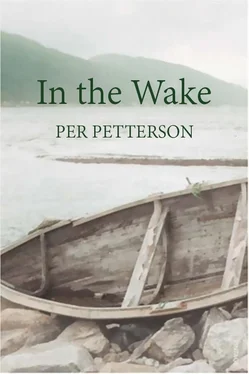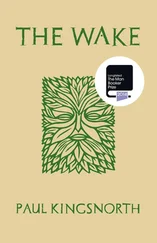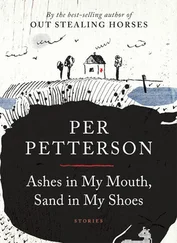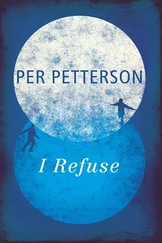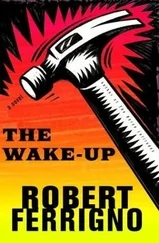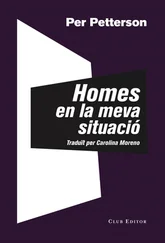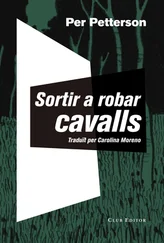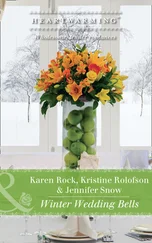THERE IS A ringing and I wake up. It is the front doorbell, I realise that straight away. I’m lying on the sofa. I look at the clock on the wall. It says eleven. I have slept for more than six hours and I’ve dreamed about him. I know I remember the dream, that it is inside me perfectly clear and plain, that I can watch it like a video, but then the bell rings again.
It is light outdoors and light indoors, I’ve got my thirty-kroner glasses on my nose, The Class Warrior is on the floor. I sit up and rub my eyes hard. That hurts, I had forgotten about the swelling. Damn, I say aloud and pick up the book from the floor and put it on the coffee table and go through the hall to open the door. It is the Kurd from the third floor. He stands there smiling.
“Hi,” he says in good Norwegian. It is a short word, though, about the same as “Thanks,” I could have managed that too, in Kurdish or whatever his language is called, if someone instructed me first. I feel suddenly shy, I haven’t quite woken up yet, I don’t know what to say.
“Hi,” I say. He holds something under his arm, a small parcel. He gives it to me, I don’t get the point, is it meant for me? He nods.
“Thanks,” he says, but it is I who should say thanks, if the parcel is for me, so I too say: “Thanks,” and then he smiles even more, and we stand there with our two short words, his cut on the cheek and the remains of my black eye, and have a conversation. Suddenly I am not shy any longer, I start to laugh, and we both laugh. I open my door wide and invite him in using international body language: fling my right arm out and make a slight bow, but then he laughs again and raises his hands palms outward and shakes his head. He points up the stairs, he has a family waiting, and in fact I don’t mind that because I’m not too sure what state my flat is in. He raises his hand in farewell and says: “Hi,” and I do the same, raise my hand and say: “Hi,” nodding. I have understood, the little gift is for last night, because I interrupted my sleep to let him and his family in when he stood outside in the cold, bleeding, so far from the high mountains of Kurdistan with the moon so close and the deep valleys with their winding roads of fine-cut chippings and the good neighbours in white-painted houses with no locks on the doors.
He starts to go upstairs. The sound of his steps is one I already know, on the way up.
“Thanks,” I say, waving the little parcel, and he turns and smiles and says: “Hi.”
We cannot take it any further, there is nothing more to say. I close the door and walk through the hall to the living room and sit on the sofa. I unwrap the parcel and put it on the coffee table. It is a small dish, a very shiny brass bowl with a design I imagine is Arabian or oriental at least, I’m really no good at the art of ornamentation, it might be Inuit for all I know. The famous Inuit brass artefacts.
I go to the kitchen and look into the cupboard and find two apples in a plastic bag. The skins are wrinkled, but they still have some colour and I go back and put them in the bowl and place The Class Warrior close to it. Two Norwegian apples in a bowl from a far country and a thick Swedish book on a white table. A still life from the home of a healthy intellectual, a man who has travelled the world. I sit there gazing. Two apples seem a little cramped, so I take one out, but that looks odd. I take them both away, roll a cigarette and light up, and as I smoke I tap the ash into the bowl. When the cigarette is half smoked, I stub it out in the middle of the oriental pattern. That really seems wrong. I have been given a present, and then I stub out my fag in it. I go back to the kitchen with the bowl in my hand, hold the stub under running water to be certain it’s extinguished before I throw it in the bin, then I rinse out the bowl and polish it with the dishcloth. It is not an ashtray. I put the bowl in the middle of the kitchen table. It may shine there in the light from the overhead lamp.
I go into the bathroom and undress, take off the bandage and have a long shower. Then I turn off the taps, dry myself slowly, wipe the steam from the mirror with the corner of the towel and study my face. Not so bad. There is a stick of make-up in the medicine cupboard left by someone whose face I have forgotten, who doesn’t need make-up any more because her face has gone, like the years have gone when I saw nothing except that face. I rub the stick lightly once or twice over the purple stain under my eye and spread it evenly with a fingertip. It looks almost natural. Perhaps I have just been sleeping badly, one eye open, always on the watch, as a writer should be.
I slam the door from the outside for the first time in a week. As I walk across the stairwell past the letter boxes on my way out, I hear a telephone ringing. It is mine. I stop, turn round and wait before turning back and then I open the door to the walkway outside. It is not locked now, it’s the middle of the day. The ringing goes on in there, but I have been at home for so long that whoever wants me could have called me before. I want to go out.
It is March. Cold sunshine over the roofs, wind over the hills, hard snow in the shadows between the blocks, and the banks of snow alongside the walkway to the Co-op are sunken and hard as bone. All else is bare and dusty dry, the air is like Perrier. It pricks and stings the throat. I cough and swallow air, housewives come out with children in warm suits, and I cough again. They stare at me. I slowly breathe and hold the air as long as I can, I restrain from coughing and just as slowly let the air out again. I feel their eyes and the wind on my back. I pull my collar up to the neck and walk between the blocks and past the Co-op and the bus stop, and on to the walkway slanting alongside the steep hill and the road where a blue bus changes down on its way up. Grey clouds sweep along high above the ridge. They block out the sun for a moment and pass on, their shadows travel along the edge of the forest above the fields towards the tall block of the Central Hospital down in the valley, and turn to yellow what was grey. I stop and stand still. I close my eyes.
There’s a strong wind. I stand alone on the hillside. I don’t know where I am going. This was not what I had expected, but I cannot go up again. So I go on downhill to the shopping centre by the main road, staring straight in front of me until I cross with the green light and walk between the cars ranked close in the car park, and in through the tall glass doors.
It is Wednesday and only one o’clock, but there are people in all the shops on the ground floor and in all the ones in the gallery on the first floor, and high up under the ceiling there are great blue-painted beams across the whole span with long rails where the big cranes moved back and forth when this was a steelworks. It seems a long time ago now, but it is only fifteen years. I knew people who worked here. Reidar did, but Reidar is dead. He too wanted to write, and he did in the end, and then he died. But we were everywhere then, we who wanted the world to be new; in factories, on building sites, in print shops and tram drivers’ seats, we wanted to assault the Winter Palace in the light of Lenin, see our muscles swell in the glimmer of molten steel, hear the tigersaw howl in red forests and stretch cables and groan and vigorously sing like the Volga boatmen, da da daa da, haaa! da da daa da, haaa! We wanted light over the land, and even if the world was like we said it was, almost all we did was wrong, for in every living room the lamps were lit and the TV sets flickered far into the night, and the world grew newer than we had ever imagined. Now the steelworks is a shopping centre, and a stone’s throw away was my father’s last shoe factory, where he jumped when the boss said jump until the factory collapsed under the weight of cheap Italian shoes, and then nothing was left. But I did not see him, did not want to see him. I saw the thousands on their march to Jenan and Dimitrov standing up against Hitler, I saw the masses of Petrograd and Mayakovsky’s posters. I saw the mountains of Albania covered with guns and draped in red banners, and compared with all that he almost became invisible.
Читать дальше
